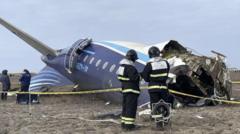On December 25, a devastating incident unfolded as Azerbaijan Airlines Flight J2-8243 crashed while approaching Grozny, claiming the lives of 38 individuals aboard. The flight, originating from Baku, Azerbaijan, was scheduled to land in Chechnya, Russia, carrying 67 passengers from Azerbaijan, Russia, Kazakhstan, and Kyrgyzstan.
Survivors vividly recalled the sequence of events as the plane attempted to land under treacherous fog conditions. Their accounts described a harrowing moment during the final landing approach when they felt explosions reverberating through the cabin. Zulfuqar Asadov, a flight attendant, reported a chaotic scene as passengers panicked following the explosions, which reportedly blew apart parts of the aircraft’s structure.
Transport Minister Rashad Nabiyev confirmed that passengers reported hearing three distinct blasts, highlighting the aircraft’s exposure to what he termed "external interference." This revelation aligns with a series of recent drone strikes attributed to Ukraine in the Chechen region, raising questions about the security of the airspace that day. Following the explosions, the flight diverted approximately 450 kilometers east to Aktau airport in Kazakhstan, although it remains uncertain why this trajectory was chosen over alternative routes.
A video from the crash site depicted the aircraft plummeting to the ground before erupting in flames, underscoring the severity of the impact. Remarkably, 29 passengers survived the crash, with some emerging from the wreckage despite sustaining serious injuries. Initial media reports incorrectly attributed the cause of the crash to a bird strike; however, experts suspect damage from Russian air-defense operations may have been the true culprit, particularly the Pantsir-S anti-aircraft systems.
Responses to the tragedy have varied, with the White House indicating preliminary evidence pointing to Russian responsibility. Yet, Azerbaijan has refrained from making direct accusations against Russia while seeking an international inquiry, as opposed to a proposed investigation by a regionally influential committee.
In the aftermath of the crash, Azerbaijan Airlines has suspended flights to certain Russian destinations, reflecting heightened concerns over safety and accountability in air travel in the region. The investigation into the incident, including the analysis of flight recorders, is underway as officials grapple with the implications of what transpired that fateful day.



















